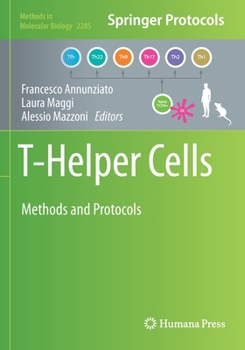T-Helper Cells: Methods and Protocols
The aim of this volume is to provide a comprehensive description of methods and protocols useful for the further study of T-helper cells. Chapters guide readers through T-helper cell recovery, molecular study, signal transduction pathways, T-cell manipulation and, last but not least, "omic" approaches. Written in the highly successful Methods in Molecular Biology series format, chapters include introductions to their respective topics, lists of the necessary materials and reagents, step-by-step, readily reproducible laboratory protocols, and tips on troubleshooting and avoiding known pitfalls.
Authoritative and cutting-edge, T- Helper Cells: Methods and Protocols aims to be a useful practical guide to researches to help further their study in this field.




















